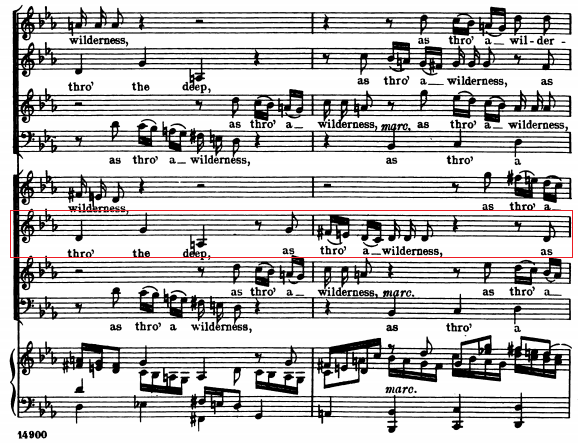Last weekend I went along to an open workshop on Handel’s oratorio Israel in Egypt with the Twickenham Choral Society. The flyer caught my attention in the local library: “Come and Sing” it proclaimed. Yes, I was up for singing. I was also up for hearing Laurence Cummings talk about Handel all day for only £20. Cut lunch and coffee included was a bonus. Still, I didn’t really know what to expect – Handel’s choruses aren’t exactly easy, and if everyone was going to be sight-reading it could be a bit of a disaster! Quite the opposite; the day was wonderful.
It turns out the open workshop is a yearly event, with about half the singers being permanent members of the choir, and the rest retired choristers, members of other choirs, and a couple of totally random blow-ins like myself and the friend I coaxed along. So most of the vocal force had already spent two months working on the choruses, and those of us truly sight-reading (I meant to bash through the score on IMSLP) were in relatively safe hands. The sound was big, rich and self-assured, with a sense of style and quite good balance.
That isn’t to say there weren’t stumbling points. The workshop aimed to cover a lot of ground: almost all the chorus material of part one, along with the final “Sing ye to the Lord” of part two. While reading alto 2 in choruses like the opening “And the children of Israel” isn’t too challenging, the runs and canon effects in “He led them through the deep” was rather hair-raising. I hadn’t sung in a proper choir for years, and was pleasantly surprised by how much my confidence and sight-reading improved over the course of a single day. By the mini-concert at 4pm, I was singing with full voice and a renewed sense of Baroque choral style. By 5pm I had no voice left!

A short extract from “He led them through the deep”, with the (somewhat tricky) alto 2 part highlighted.
The most invigorating part of the workshop was most certainly Laurence Cummings – his passion for Handel’s music was the driving force through the day. He didn’t dumb down the musical concepts at all; we were singing Handel and so should aim for the clarity and fineness that he expected of a professional choir. Of course, he made some concessions for accuracy, and forgave a whole manner of sins in the tricky interlocking passagework of the final chorus “Sing ye to the Lord.” Yet he also breathed incredible life into the score, particularly the text. He was constantly encouraging us to consider the meaning of the text, emphasising that in Baroque music repetition meant we needed to find a different interpretation of the same lines. Laurence also wanted us to embrace the grotesque and bizarre – lines like “and there came all manner of flies, and lice in all the quarters” needed to be crystal clear so our audience got the full picture. All fed into the day’s central concept: theatre of the mind created through music.
While Israel in Egypt still isn’t my favourite Handel oratorio, the day has certainly prompted a renewed interest in it. I’ve listened twice through the whole thing over the past week, and enjoyed the exhilaration of the music (and, let’s be honest, just how bizarre some of the text is). Most importantly, though, was the exhilaration of singing, of being part of a greater whole with the joint goal of creating wonderful music.
Thanks Twickenham Choral Society, it was great!
Of the recordings in Youtube, this version with the Leeds Festival Chorus, English Chamber Orchestra and Sir Charles Mackerras is certainly my favourite for sheer energy. “He gave them hailstones for rain” and 20:00 is particularly wonderful. The vocal score is on IMSLP if you want to follow along!

